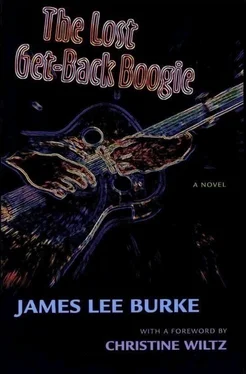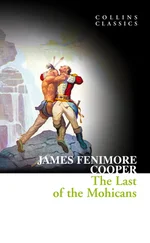I made twenty-five dollars a night and my share of the tips from the money jar on the bandstand. I worked in well with the band, which was made up of hillbillies who played only country and juke-joint music. My first night I played and sang six Hank Williams songs in a row, then went into “Poison Love” by Johnny and Jack and “Detour” and “I’ll Sail My Ship Along,” and the place went wild. They jitterbugged and did the dirty boogie, yelled from their tables, roared with some type of nostalgic confirmation when they recognized an old song, and dropped change and dollar bills into the money jar. Oil-field roughnecks with tin hats and beery faces and drilling mud on their clothes looked up at me with moist, serious eyes when I sang “The Lost Highway.” I was good at imitating Hank Williams, and I could make the Dobro sound just like the steel that he had used behind him.
I was just a lad, nearly twenty-two
Neither good nor bad, just a kid like you.
Now when I pass by, all the people say
Just another guy on the lost highway.
I played there three weeks and picked up an afternoon job on Sundays at a club in St. Martinville, which got me into trouble with the parole office. The St. Martinville band had a thirty-minute television show on Sunday mornings, and as an aside into the microphone the singer decided that he would mention that their Dobro man, Iry Paret, would be at the club with them that afternoon.
So when I went in for my visit with the parole officer that week, I noticed first the stiffness of his handshake and then the rigidity of his elbows on the desk and the folded hands under his chin while he talked. We had to go around three corners before he got to it, but he did. And like most people who ask to be conned, he now felt that he had stepped too far over a line into a large hole.
“You didn’t report that you were working in a nightclub,” he said.
“It’s not much of a job. I’m just sitting in temporarily.”
It was an easy offering if he wanted to continue the con, but I could see the struggle in his face to turn the compromise around, and I knew that it was going to be at my expense.
“Your parole agreement stipulates that you won’t return to any of the past associations that contributed to your crime. I know that’s vague on a piece of paper, but in your case it means playing in beer joints and driving home drunk at four in the morning.”
“It’s the only living I have, and I was flat broke.”
“Maybe we could have worked that out, but you should have reported in before you took the job. It would have cost you one telephone call.”
“Let’s get the rest of it out of the way, too,” I said. “I’ve got a gig over in Thibodaux for twenty-five bucks a night. There’s no fights and the cop at the door doesn’t let hookers in and I leave there sober after we finish.”
I felt like a child explaining his conduct to an adult.
“Why did you do that? Why did you decide that you couldn’t trust me?”
“Mr. Mouton, it wasn’t a matter of trust. I was simply broke.”
“But you think the parole office is something to use evasion on.”
I had to catch my anger and humiliation in my throat before I spoke again. My unlit cigarette trembled in my fingers, and the other ex-convicts on metal waiting chairs and parole officers and secretaries in the room were listening to our conversation with an oblique, withdrawn enjoyment.
“I can’t do anything else except hustle jugs on a doodlebug crew or carry hod, and they’re not hot to hire ex-cons in the union,” I said.
He stroked lines with a ballpoint pen on his note pad.
“I don’t know,” he said. He was taking out every ounce of blood that he could. “I talked with your brother yesterday. He said he could get you a job on a well test in Opelousas.”
A well-test job in the oil field meant stringing flange pipe through a filthy sump hole for seventy-five cents an hour, and the job usually entailed only the day of the well’s completion, which meant that it was no job at all.
“He didn’t tell me about it,” I said.
“It’s there if you want it.”
I lit the cigarette and leaned closer to him on my elbow with the butt touching against my brow. He didn’t like the directness of the position, and he opened a side drawer in his desk as though he had forgotten a form or part of my file.
“Do I get violated back to Angola, or do we just play badminton awhile?” I said.
He wasn’t good at that kind of encounter, and after he had pushed back the desk drawer with a slow, flat hand and ticked his thumbnail along the edge of my file, he said: “Your transfer will probably come through in a week. Everything I sent into Baton Rouge was positive, and I made a case for your war record. But you don’t play in any more bars until you leave Louisiana, and then you’re somebody else’s responsibility.”
I looked at him blankly and sat back in the chair.
“That’s it, Iry. You’re cut loose,” he said.
The letter came from Baton Rouge three days later. I had four weeks to settle my affairs and report in to the parole and probation office in Missoula. Ace had transferred the title of the pickup to me, and I had $275 saved from my two jobs. I pushed my sleeping bag and tent with the wood supports wrapped inside the canvas behind the front seat and loaded a big box of canned stew meat, corned beef, bread, sardines, and soda crackers in the truck bed and stretched a tarpaulin over the sides.
The next morning I was rolling through the piney woods of east Texas, with the mist still in the trees and the red clay banked on each side of the road. By Dallas the radiator was blowing steam from under the hood, and a kid in a filling station had to knock the cap off with a broomstick. I pushed it on through the scorching afternoon to Wichita Falls, where the water pump went out and I had to spend five hours in a tin garage that enclosed the heat and humidity like a stove. I ate a can of stew meat cold and started chewing on No-Doz south of Amarillo. I should have pulled into a roadside park to sleep, but I was hooked on the highway and the combination of beer and No-Doz now, and I knew that I could roll it all the way to Denver.
The accents began to change in the filling stations and the truck stops, and then in the early dawn I saw the first mesa in the Panhandle. It rose out of the flat country like a geological accident, its edges lighted with a pink glow, the eroded gullies filled with purple shadow. The cotton and cornfields were behind me now, and also the patent medicine and MARTHA WHITE’S SELF RISING FLOUR signs, the vegetables and watermelons sold off the backs of trucks along the roadsides, the revival tents set back in empty pastures, the South itself. It simply slipped past me over some invisible boundary that had nothing to do with geographical designation, and then it was Dalhart and Texline, where the grain silos stood gray against the hot sky and clouds of dust, and finally Raton, New Mexico.
I was in a stupor from the No-Doz and case of beer that I had drunk in the last twenty-four hours, and my eyes burned with the shimmer of heat off the blacktop. I put my head under a filling-station hose and let the water sluice down my neck and face and then ate a steak in the cafe. But I was finished. My hands, lined with the black imprint of the steering wheel, were shaking, my back ached when I walked, and I could still feel the truck’s engine vibrating up through my legs.
The filling-station operator said I could park my truck behind the building overnight, and I unrolled my sleeping bag in the bed and used the tarpaulin and my shirt as a pillow. For a while in the softness of the sleeping bag I was aware of the semis hissing air on the highway and shifting down for the long pull up Raton Pass; then I felt myself drop down into the smell of the canvas and the cool air against my face and a quietness inside me.
Читать дальше












